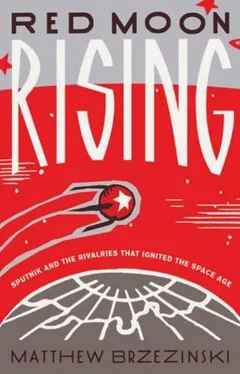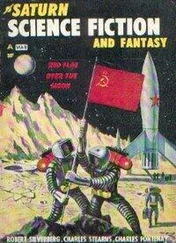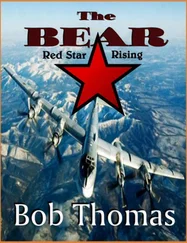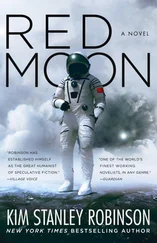Tupolev bombers, 25–26, 127
Turkey, 41, 116, 129, 270–71
Twining, Nathan, 58
Tyura-Tam test site, 96–97, 100, 102, 117, 128–32, 146, 148, 150–60, 205
U-2 spy plane, 115–28, 130–35, 178–79, 185, 205
Cuban missile crisis and, 271
satellites replace, 249–50
USSR shoots down, 270
Ukrainian Society of Aviation and Aerial Navigation, 107
United Fruit Co., 118
United Nations, 75, 78, 241
United Press International, 179
United States. See also specific government agencies; individuals; and programs
bases of, in Europe and Asia, 25
development of jet power in, 45–59
first satellite launch by, with Explorer and Juno, 260–67
German scientists gathered by, 14
Hungarian revolution of 1956 and, 74–76
IGY satellite program and, 92–93
impact of Korolev and Khrushchev’s space program on, 274–75
Korolov speaks of satellite plans of, to get Soviet support, 43–44
lag behind Soviets in space, after Explorer, 268–69
leads in ICBM race, 269–70
military spending, vs. USSR, 38
missile gap and, 251–53
missile launch pads and, 153
missile program of, downgraded vs. bombers, 79–82
nuclear weapons and bombers of, 24–26
prepares first Explorer launch after Vanguard failure, 247–51, 254–56
response of, to Sputnik I, 165–87, 274
response of, to Sputnik II, 213–34
satellite program of, rumored in Moscow, 151–52
school integration crisis in, 136–40
Sputnik’s propaganda success and, 199
spy satellite program and, 249–51
storable solid-fuel rocket, 155
surpasses Soviets with Saturn rocket, 273
surveillance of USSR and, 129
threatened by range of R-7 missile, 40–41
U-2 plane developed by, 115–35, 270
V-2 rocket and scientists sought by, with defeat of Nazis, 8–11
Vanguard failure and, 238–43
von Braun moves to, 83–92
U.S. Congress, 49, 50, 55, 79, 93, 132, 135, 144, 174, 178, 182, 184, 213–14, 222, 224
U.S. Information Agency (USIA), 200, 201, 241
US News & World Report, 173, 182
U.S. Senate, 53, 56–58, 135, 167, 213–15
Armed Services Committee, 80, 174–76, 214
Armed Services Subcommittee on Preparedness, 183–84, 214–15, 221, 229–30, 231, 247–48, 250, 251–53, 274
U.S. Supreme Court, 136–37, 139
Ustinov, Dmitri, 8, 18, 36
Uzbeks, 63
V-2 rocket (Vergeltungswaffen-2, Vengeance Weapon), 36, 38, 92, 166
Nazi Germany develops, 1–6, 11–13, 235–38
Soviet rockets and, 6–8, 12–15, 29–30, 34, 40, 67, 68
U.S. rockets and, 8–12, 52, 255, 261, 277
Van Allen, James, 255
Vance, Cyrus, 229
Vanguard program, 133–35, 162–63, 165–67, 171, 179, 202
cost overruns of, 226–27
failure of, 224–30, 232–34, 238–44, 247, 250–51, 255–60, 263–64
first test of, 185–87, 224–25
funding for, 249–51
Versailles, Treaty of, 236
Vietnam War, 274–75
Viking rocket, 225–26, 233–34
von Braun, Iris, 90
von Braun, Magnus, 87, 89, 224
von Braun, Margrit, 90
von Braun, Maria, 86, 90
von Braun, Wernher
ABMA missile program and, 48, 51, 79, 102, 129, 144, 162–63, 187, 202, 218, 220
background and Nazi past of, 5, 9, 14–15, 86–87, 234–38, 277
Disney and, 91–92, 121, 234–35
Explorer satellite and, 224–25, 248–49, 254–56, 258, 260–61, 263–65, 267
Korolev keeps abreast of, 100, 102
legacy of, 276–77
manned flight and moon landing proposed by, 249
moves to U.S. after WW II to work on missiles, 83–92, 238
salary of, 122
satellite proposal of, turned down, 92
satellite surveillance proposed by, 132–35
Sputnik success and, 165–68, 186–87
von Freed, Charles, 180
Voroshilov, Kliment, 111
Voskresenskiy, Leonid, 98–99, 113–15, 153, 155–57, 261
Wallace, Mike, 229
War of the Worlds (movie), 92
Warren, Earl, 139
Warsaw Pact, 72, 75, 270
Washington Evening Star, 182, 213
Washington Post, 176, 181, 221
Werhmacht, 166, 235
Western Ukrainians, 32, 63
West Germany, 83, 129, 277
White, Thomas D., 82
White Army, 105
White Sands Proving Ground, 12
Wiesl, Ed, 229
Wiley, Alexander, 171
Williams, G. Mennen, 230–31
Wilson, Charles E. “Engine Charlie,” 48–53, 58, 79, 82–83, 93–94, 102, 129, 132, 134, 161–66, 170–71, 178, 181, 204, 227, 229, 247–48
Wilson, Charles “Electric Charlie,” 49
Wilson, Glenn P., 215
Winterstein, William, 86
Woods, Randall B., 175
World War II, 38, 40, 46, 177, 183, 189–90, 235–38
WS-117L reconnaissance satellite, 249–50
Yangel, Mikhail, 101, 205, 247, 271
Yates, Donald, 262
Yesenin, Tolya, 198
Yugoslavia, 41–42, 193
Zhukov, Georgy, 6, 76, 109–112, 181, 189–94, 201

MATTHEW BRZEZINSKIis a former Moscow correspondent for The Wall Street Journal and has reported extensively on homeland security issues for The New York Times Magazine and other publications. He is the author of Casino Moscow: A Tale of Greed and Adventure on Capitalism’s Wildest Frontier and Fortress America: On the Front Lines of Homeland Security .
He lives in Washington, D.C.
Advance Praise for RED MOON RISING
“The writing is fast-paced and crisp, the stakes high and the tension palpable from the first pages of this high-flying account of the early days of the space race…. Yet even more than his absorbing narrative, Brzezinski’s final analysis has staying power.”
—
Publishers Weekly (starred review)
“Matthew Brzezinski explores both sides of this hardboiled Cold War conflict in a taut chronicle… [that] reads more like a spy thriller than a history book.”
—
Kirkus Reviews
“In our fear of terrorist attacks, we forget there was an even more panicky time—when Russia’s Sputnik first sped across the night sky in October 1957, signaling that the Soviet Union could launch nuclear-tipped missiles at the United States. By plumbing Russian as well as American sources, Matthew Brzezinski has given us a vivid, insightful account of that paranoid age.”
—Evan Thomas, author of
Sea of Thunder and coauthor of
The Wise Men
“Matthew Brzezinski’s Red Moon Rising fills a significant hole in our understanding of the Cold War. Using the Sputnik launch as his centerpiece, Brzezinski brilliantly flashes back and forth between Washinton, D.C., and Moscow. A truly gripping, important book.”
—Douglas Brinkley, author of
The Great Deluge and
The Boys of Pointe du Hoc
“Matthew Brzezinski’s reportorial skills and smooth writing propel the narrative forward at the perfect pitch. Red Moon Rising is a combustibly entertaining mixture of scientific daring, politics, Cold War duels, and big-time personalities.”
—Neal Bascomb, author of
Red Mutiny
“Matthew Brzezinski has crafted a dazzling account of the people and events that led to the world’s first earth satellite. It is one of the most important stories of the twentieth century, and Brzezinski tells it supremely well. His account not only tells us how the Russians did it, but how the Americans, bewildered at first, finally got going with their own space program. It is historical storytelling at its finest, and I thoroughly enjoyed every page. In a word: Prodigious!”
Читать дальше













